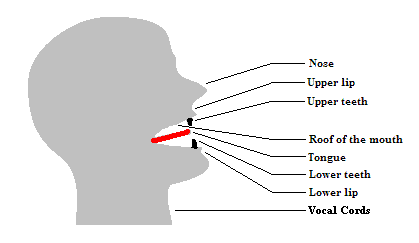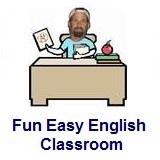| o |
wolf,
woman |
| oo |
book,
brook, cook,
good, look,
soot, stood,
took, wood |
| ou |
could,
should, would |
| u |
bullet,
full, pudding,
pull, sugar |
|
|
|
Note: the red
letters all have the same sound |
|
|
|
Sound:
Voiced and Unvoiced
This is a VOICED sound which means Your Vocal Cords DO
vibrate when making this sound. |
 You CAN
LISTEN to your Vocal Cords vibrating if you cover
your ears with your hands. You CAN
LISTEN to your Vocal Cords vibrating if you cover
your ears with your hands.
Try covering your ears with your hands as Akiko is doing in
the picture.
Now make the sound of this lesson. Can you listen to your vocal cords vibrating?
VERY GOOD |
 You CAN
FEEL your Vocal Cords vibrating if
you place your hands on your neck. You CAN
FEEL your Vocal Cords vibrating if
you place your hands on your neck.
Try placing your hands on your neck as Akiko is doing in the
picture.
Now make the sound of this lesson. Can you feel your vocal
cords vibrating?
VERY GOOD |
|
The following diagram shows the most important parts of your
head and mouth used for pronouncing the sounds of English.
It also shows the location of your Vocal Cords. |
 |
|
|
Mouth, lips,
and tongue
The following descriptions explain the proper mouth, lips,
and tongue position when you make this sound. |
Your
mouth should be relaxed. |
Your lips should be rounded and in the same
position as when you kiss someone. |
The back part of your tongue should be in the upper part of your
mouth. |
|
|
Additional Lessons |
 About These
Lessons About These
Lessons
The following classroom lessons are great for students
who want additional conversation, listening, and reading
practice. |
-
Conversation Lesson -
Intermediate Level. Let's
Learn English conversation lesson
with a conversation video, a video script, audio
listening practice, and a new
words section.
|
 Conversation Lesson
26 - Look-alikes Conversation Lesson
26 - Look-alikes
(Intermediate -
Conversation, Listening, Reading)
In this lesson Anna learns that someone at work looks a
lot like her. But, who is this person? And what happens
when they finally meet? |
Lesson Video
Watch the video and then read the video script. |
Video Script
ANNA: This article is so interesting. Pete, listen to this: “Somewhere in the
world there is someone who looks just like you.”
PETE: No one is this handsome.
ANNA: Oh Pete, there's something between your teeth.
(Pete tries to clean his teeth.)
PETE: It is gone?
ANNA: No. No. It’s still there. There. You got it. But think of it: There could
be two of us in the world!
PETE: Two Annas?
PROF. BOT: Two Annas? Today, we’re reviewing ways to describe and compare
people. Keep watching for descriptions of people!
PETE: Actually, Anna, maybe your silly article is right. Yesterday at work, I
met a woman who looks just like you.
ANNA: Really? Wait, are you making fun of me?
PETE: Not this time.
PETE: She’s tall and has curly hair. But even her face looks like yours. I think
she’s a career consultant.
ANNA: I bet she has a lot of great advice. I can’t wait to meet her.
PETE: Yes, you can. I met her and she is very difficult.
ANNA: Pete, she’s just new. We have to give her a chance. What’s her name?
PETE: Evelyna or something like that. You can’t miss her. She always wears a
hat.
PENELOPE: So, Anna, have you met the new consultant yet?
ANNA: No. But I’ve already heard. We look alike, don’t we?
PENELOPE: Yeah, but you don’t act alike. You’re much nicer than she is.
ANNA: Maybe she gets nervous at new jobs. Or maybe she's shy. Let’s not judge,
Penelope.
PENELOPE: She’s not nervous or shy. She’s mean.
ANNA: You know, we should get to know her better. Let’s invite her to lunch!
PENELOPE: Sorry but I’m busy that day.
(Penelope walks away. Anna yells after her.)
ANNA: Oh, that’s too bad. Hey, I haven’t picked a day yet!
PROF. BOT: So, did you find anything? Here are a few things I found: Anna uses
the words “look alike” to talk about the new consultant. She says, “We look
alike, don’t we?”
PROF. BOT: Penelope uses “than” and the comparative adjective “nicer” to compare
Anna with the new consultant. She says, “You’re much nicer than she is.” Keep
watching for more!
(Anna and Pete are playing a game.)
ANNA: This is going to be so much fun. Boy, I can't wait to play this game.
EVILANA: How much longer are you going to be?
ANNA: We’ll be just a minute …
(Anna turns around and sees her look-alike.)
ANNA: You must be Evelana. I’m Anna. We are look-alikes!
EVILANA: No, we’re not. And my name is pronounced “Evil-ana.”
PETE: Oh. This is going to be fun.
EVILANA: You had better hurry up. I need this room for a lecture. It’s called:
"If You Want to Win, Others Must Lose." What is all this stuff, anyway?
ANNA: It’s a game. We’re going to play at lunch.
EVILANA: It’s a stupid child's game!
ANNA: It's a fun game. But yes, it is for children.
EVILANA: Well, you may be childish but I’m not. And you look stupid with that
thing on your head.
ANNA: Well, you look serious with that look on your face. Come on, Pete. Let’s
play somewhere else.
PETE: Actually, I’m going to stay for Evilana’s lecture.
ANNA: Fine. You can learn new ways to beat people.
EVILANA: He will. He will.
(Days later, Anna and Penelope are playing the game. Pete comes in. He has a
problem with his eye.)
ANNA: Okay. Am I a food?
PENELOPE: Nope.
PETE: Hey, do you guys have room for one more?
PENELOPE: Sure, Pete! Come on over. What happened to your eye?
PETE: Evilana “accidentally” hit me. And she didn’t even say sorry. She’s so
mean!
PENELOPE: I told you so.
ANNA: Here, Pete. Put on this headband. You’ll feel better. Penelope, you’re
right. Evilana is an awful person!
PENELOPE: And violent. And now we have to work with her!
ANNA: Haven’t you heard? She’s gone! She was given another assignment.
PENELOPE: What assignment?
ANNA: I’m not sure. I think it has something to do with outdoors. Anyway, let’s
play! Pete it’s your turn. |
Listening
Now practice listening to only the audio portion of the conversation. |
Test Yourself
How well do you know the grammar from Level 2? Test yourself!
In today's lesson, you saw examples of grammar from other lessons. Look for
sentences in Lesson 26 that have:
comparatives
passive voice
had better
would rather
conditionals
tag questions
say, tell, speak or talk
Writing Practice
Today, you learned some new language for describing people.
We also reviewed comparative adjectives and sentences using the word than. For
example, Penelope says, "You're much nicer than she is."
For more on comparatives, watch Lesson 5: Greatest Vacation.
Now, you try it!
Think of a person in your family, a friend or someone else. Then, describe the
person. What do they look like? What do they act like?
Next, write a few sentences comparing yourself to that person with comparative
adjectives and than. For example, "I'm taller than my friend."
Tell Us
Did you like today's lesson? Don't forget to let us know what you think. We'd
love to hear from you! You can tell us in the Facebook Comments section below. |
|
New Words |
- alike –
adj. similar in appearance, nature or form
- article –
n. a piece of writing about a particular
subject that is included in a magazine, newspaper, or on a website
- beat –
v. to defeat
- bet –
v. to think that something will probably or
certainly happen
- compare –
v. to look at two or more things in order to
see what is similar or different about them
- describe –
v. to say what something or someone is like
- difficult –
adj. stubborn or unreasonable
- handsome –
adj. pleasing to look at
- headband –
n. a band of cloth or some other material worn
on or around your head
- judge –
v. to form an opinion about
- lecture –
n. a talk or speech given to a group of people
to teach them about a particular subject
- look-alike –
n. someone or something that looks like another
person or thing (also written: lookalike)
- lose –
v. to fail to keep or hold something wanted or
valued
- making fun – tease, laugh
at, or joke about someone in a mocking or unkind way
- mean –
adj. not kind to people; cruel or harsh
- miss –
v. to fail to see or notice
- pronounce – v. to make
the sound of a word or letter with your voice
- shy –
adj. feeling nervous and uncomfortable about
meeting and talking to people
- tooth –
n. one of the hard white objects inside the
mouth that are used for biting and chewing (plural: teeth)
- turn –
n. an opportunity or responsibility to do or
use something before or after other people
- violent –
adj. using or involving the use of physical
force to cause harm or damage to someone or something
|
 Conversation
Lessons Conversation
Lessons
Study all 30 English intermediate conversation lessons.
Let's Learn English conversation lessons each with a
conversation video, a video script, audio listening
practice, and a new
words section.
These lessons are for
intermediate students. |
 Conversation
Lessons Conversation
Lessons
Study all 52 English beginner conversation lessons. Let's Learn
English conversation lessons each with a conversation
video, a video script, audio listening practice, video
speaking practice, video pronunciation practice, a new
words section, and a writing activity.
These
lessons are for beginning students. |
|
Source:
Voice of America |
|